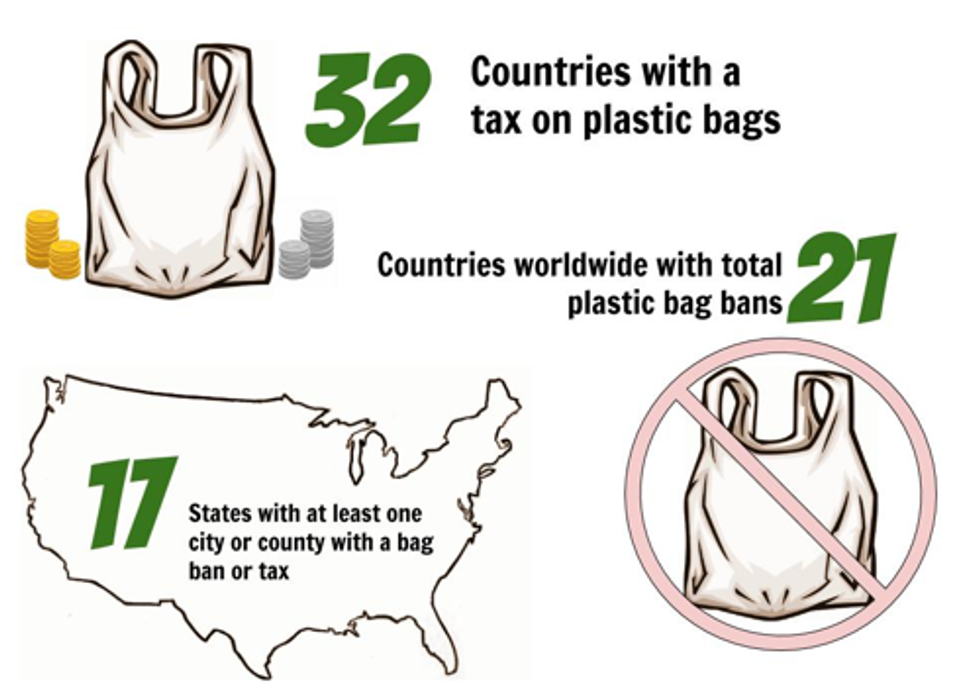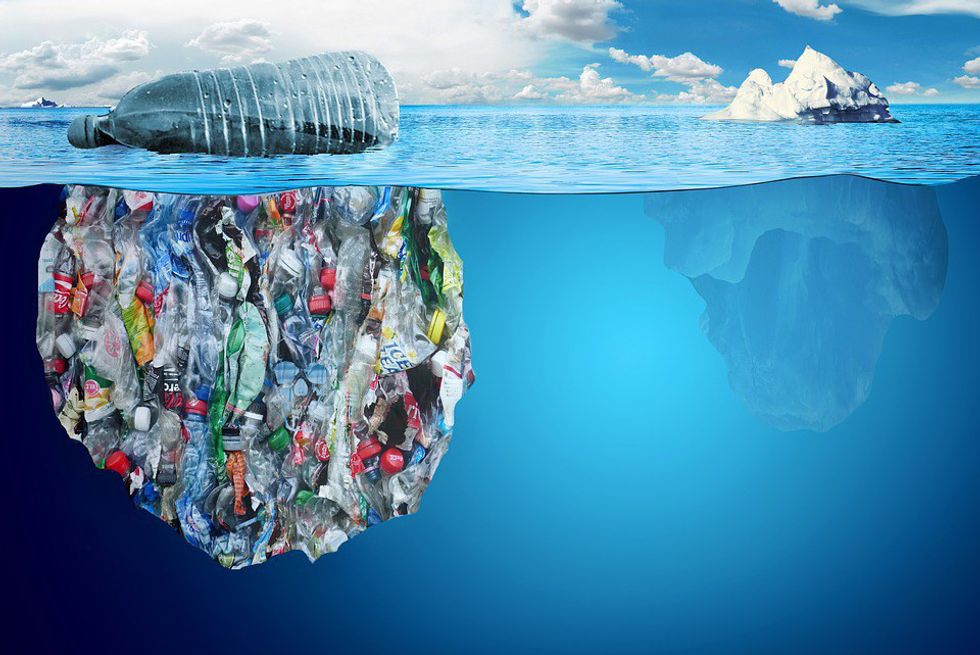The momentous and everlasting life of plastic bags begins in manufacturing facilities – the birthing centers to what is known to be one of the most hazardous materials to the environment. Millions of bags created for 20 minutes of use. The bags are everywhere, over occupying consumer households, landfills, grocery and retail stores. They continuously congest state parks, waterways and interstates.
For Arizona, plastic bags are a controversial issue and concerning environmental entity. Over the years, U.S. states and cities have begun to adopt plastic ban bags and fines – California being the first state legislature to enact a ban the bag bill. Cities that follow include Chicago, Austin, Seattle and more.
However, for some states and cities, the proposal to ban the bag is either at a standstill or progressing at a trickling pace.
Arizona, Idaho, and Missouri are the only states amongst the 50 that have enacted bills where state legislatures are preventing localities from imposing fees on plastic bags, regulating the sale or use of plastic bags and banning plastic bags entirely.
Photography by: Morgan Louvier
Flagstaff, Arizona is one city in particular that was hit hard by these preventative measures. Around three years ago, an environmental campaign known as Ban the Bag Flag emerged in Flagstaff which advocated for the banning of plastic bags in Flagstaff in hopes of creating a more sustainable community.
Despite the persistent efforts of campaigns like Ban the Bag, Governor Doug Ducey struck down their efforts by signing SB 1241, April 13, 2015 – according to Vote Smart voting records. SB 1241 made it impossible for individual cities to pass laws regarding the use and distribution of plastic containers.
Senate Bill 1241 has since been revised into Bill 2131. Ducey’s further legalization of Bill 2131 in March 2016 has hindered the state from joining other states and cities that have banned plastic bag.
The bill – among other restrictions – prohibits Arizona localities from enforcing charges and restrictions on plastic grocery bags.
Bret Fanshaw is the State Advocate for Environment Arizona and an active member with Environment America. Fanshaw believes Arizona State Legislatures extinguished Ban the Bag movements before they had a chance.
“The reason the opposition is trying to pass laws limiting cities from taking action themselves, is because that is what worked in California,” said Fanshaw. “When you are able to pass a patchwork set of bans, it’s going to force the state to act and so they’re preempting that action. I think that’s part of their strategy and it’s unfortunate because this needs to happen. Also because cities should be able to act on their own and take some of these good examples that we have seen of environmental stewardship and ban the bag.”
Despite the passing of Bill 2131, Fanshaw relentlessly advocates the importance for the public to stand up for environmental values and uphold legislative officials to their responsibilities.
Infographic by Ellie Kerbleski
“Plastic may never actually biodegrade. If you drive around Arizona, you can see [plastic bags] stuck in trees or in our rivers and waterways,” said Fanshaw. “There are some really nasty things that can happen when you have plastic bags. These things get away into our communities and our eco systems. Something that we use for five minutes should not be something that should threaten our environment for the next five hundred years or more.”
Arizona Forward is another environmental group that is centered on improving the environmental sustainability and economic vitality of Arizona. The organization aims to bring civic leaders together to achieve multifaceted environmental missions for Arizona and local regions. Diane Brossart is President and CEO of Arizona Forward.
As an individual, Brossart believes that recycling and eliminating the use of plastic bags are environmental aspects to put at the forefront of concerns – on a state, national and global spectrum.
“Recycling is very important, we produce so much waste as a society in Arizona and around the globe,” said Brossart. “We are mass producers of waste and recycling is critically important everywhere – some things are easier to recycle – plastic bags being difficult.”
Brossart notes that for change to happen, the public must take initiative to become educated to recycling procedures to further eliminate the use and waste of plastic bags.
“It’s important to educate the public that plastic bags, wraps and other plastic materials can’t be put in curbside recycling,” Brossart said. “People need to know how they can contribute, and I think given the right information they will contribute.”
She also brings positive attention to the growth in the ethical environmental consumerism of Arizona citizens.
“I think that personal responsibility is important and I think that we can all do better,” Brossart said. “I have started to see more and more people bringing their own bags to grocery stores.”
Conversely, are the efforts to eliminate plastic bag use and recycling by Arizona citizen’s efforts enough to improve the ecological state of Arizona?
According to the 2014 Arizona Municipal Recycling Data Report, 10,935.87 tons of plastic was recycled in 2014. In comparison to the 2013 report, 14, 838.46 tons of plastic recycled – which makes for a sizable decrease in recycling.
Though Arizona has a slightly larger population, Tennessee – a state with a nearly matching population to Arizona – recycled almost 6 times the amount of plastic than Arizona in 2013 and 2014. Tennessee recycled 76,044.4 tons of plastic in 2013 alone.
The environmental burdens of plastic bags are not solely bound to Arizona.
From coast to coast of the U.S., plastic bags are not only a nuisance to cities but also find themselves in the stomachs of land and marine animals. Once in the oceans, they pile amongst other hazardous materials – consequently creating garbage vortexes.
“In some parts off the coast of the U.S., plastic bags end up in the oceans and contributed to the Great Pacific Garbage Patch which is about twice the size of the state of Texas,” said Fanshaw. “The plastic breaks up into smaller and smaller pieces and it looks like plankton and the fish eat it. There are also some stories about whales beaching in Seattle with dozens of plastic bags in their stomachs.”
Research done earlier this year by the Ellen MacArthur Foundation, found that if trends continue at the rate they are at now, by 2050, we can expect to see more plastic (in weight) than fish in our oceans.
Additionally, according to the Earth Policy Institute, a trillion single-use plastic bags are used each year worldwide– almost 2 million each minute. It is also estimated that the U.S. uses around 100 billion plastic shopping bags each year, which approximately accounts for 12 million barrels of oil used to create plastic bags.
The cognizance of the environmental damage that plastic has is recognized across the world. By analyzing the plastic bag bans in other countries, as well as U.S. states and cities, Fanshaw makes tangible the renowned ecological and environmental outcomes that come from banning the bag.
“There are many countries from around the world that have banned plastic bags and we should be following in their example,” Fanshaw said. “Even in our own country, the state of California passed a state ban on plastic bags and that came after more than 108 California communities passed plastic bag bans – the state legislature then acted on that ban.”
While plastic bag bans have brought prominent change, it also has substantial economic impacts.
According to the opposition group Bag the Ban, more than 24,600 Americans are employed by plastic manufacturing companies and recycling facilities nationwide. Banning plastic bags on a state-to-state and city-to-city level has the magnitude to severely impact jobs and American employment rates.
Photograph by: Morgan Louvier
Brossart stresses that in the future, if Arizona is to ban the bag, there must be economic and environmental balance.
“All of the issues that we deal with relating to the environment gets back to this balance between environmental quality and economic vitality,” Brossart said. “The two definitely go hand in hand. You can have a good healthy environment and also have a vibrant economy if you plan right but we need to achieve balance. In the case of plastic bags, there can be a balance. “
According to the 2015 Occupational Employment and Wage Estimate from the Arizona Department of Labor – roughly 20 thousand citizens work plastic related manufacturing and operations jobs.
If the Arizona legislature is to revise, and or replace Bill 2131 with a state plastic bag ban, how will jobs lost be subsidized? It is expected that Arizona legislators will consider this question in the future.
Knowledge and diligent action continuously prove to fuel change. This notion has been acknowledged by countries around the world by upholding government officials and legislatives to their political and environmental responsibilities.
Arizona Bill 2131 may be in legislative effect but hope to elimination the use of plastic bags has not been abandoned. Arizona citizens can still do their part.
“Instead of focusing on where we disagree, how about we all agree that plastic bags are not good for the environment,” Brossart said. “We should avoid them whenever we can by making a choice at the counter to not use plastic or to bring our own bags to the grocery store.”














































